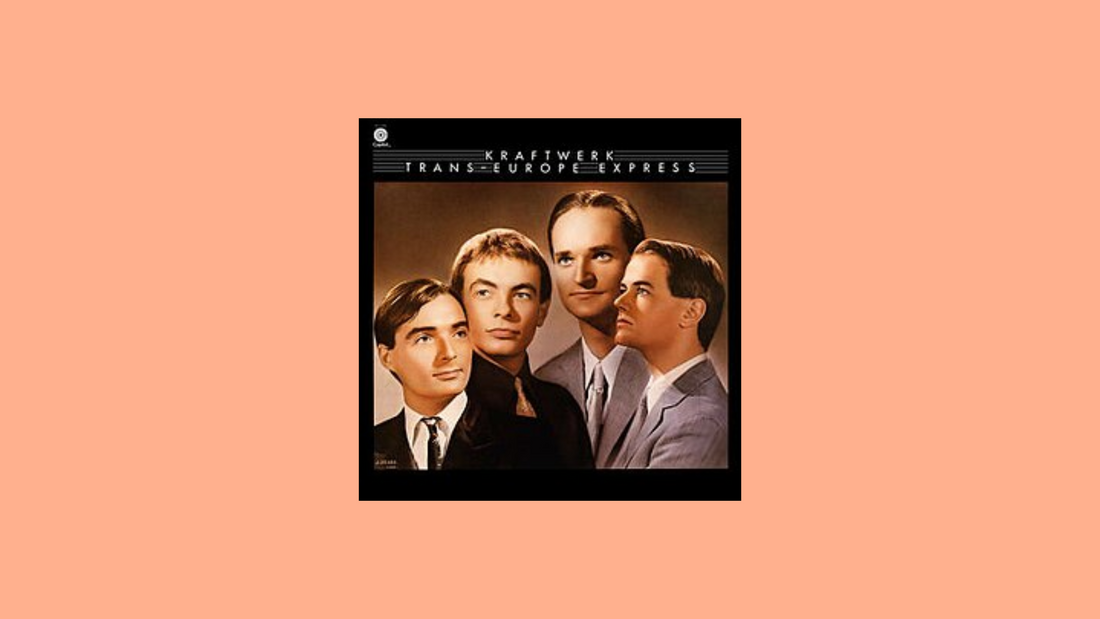
Kraftwerk – Trans-Europe Express (1977)
By Rafi Mercer
The sound of a train: metallic rhythm, steady pulse, the click and hiss of wheels on track. Out of this mechanical cadence, a melody emerges — synthetic, gliding, both futuristic and strangely nostalgic. This is how Kraftwerk open Trans-Europe Express, their 1977 masterpiece. It is not simply a record about trains, or technology, or Europe. It is about movement itself: the way rhythm structures time, the way sound reshapes space, the way listening can feel like travel.
By the mid-1970s, Kraftwerk had already established themselves as pioneers of electronic music. Their earlier albums — Autobahn (1974), Radio-Activity (1975) — had mapped the possibilities of synthesisers and sequencers, turning the ordinary acts of driving or tuning into art. But Trans-Europe Express refined their vision. Sleeker, more minimal, more deliberate, it presented electronic sound not as novelty but as architecture. Every beat is precise, every tone deliberate. The result is an album that feels as modern today as it did on release, a blueprint for electronic music’s future.
The title track, Trans-Europe Express, is its centrepiece. Built on the steady rhythm of sequenced percussion, it evokes the glamour of European rail travel — Paris, Vienna, Düsseldorf — not in literal description, but in atmosphere. Ralf Hütter’s vocals are half-sung, half-spoken, delivered with icy detachment. The lyrics reference David Bowie and Iggy Pop, figures who themselves were reshaping European art in Berlin at the time. Yet the track is not about personalities. It is about a network, a system, a modernist dream of connection. Listening, you feel yourself carried along rails that extend beyond geography into imagination.
Europe Endless, the album’s opener, sets the tone: a long, patient track built from repeating motifs, cycling chords, and synthetic voices. The repetition is hypnotic, suggesting infinity. It is less a song than a landscape, a sonic map of borders dissolving. Hall of Mirrors follows with a darker mood, its lyrics reflecting on image and distortion, fame and artifice. Here, Kraftwerk reveal their fascination with identity in the machine age — how we see ourselves, how technology refracts those visions back at us.
The record is spare compared to later electronic forms. There are no dense layers, no climaxes. Instead, everything is stripped to essentials: rhythm, tone, texture. This economy gives the music its force. Like modernist architecture, it derives beauty from proportion, clarity, repetition. Each element has weight; nothing is wasted. The listening experience is less about narrative than immersion. You enter a system of sound and allow yourself to be carried.
At the time, Trans-Europe Express felt radical. Few albums were so unapologetically synthetic. Many still clung to the authenticity of guitars, drums, the “human touch.” Kraftwerk embraced the opposite. They dressed as mannequins, performed with robotic stillness, erased the boundary between human and machine. For some, this seemed cold. For others, it was liberation: a new aesthetic where the future was not feared but embraced.
The influence was immediate and vast. Hip-hop DJs in the Bronx picked up the title track, looping its beats into block-party anthems. In Detroit, pioneers of techno drew directly from its rhythms and minimalism. Across Europe, electronic artists saw in it a model for precision and experimentation. Bowie, who was namechecked in the lyrics, responded with “Heroes” and Low, albums indebted to Kraftwerk’s sound-world. Decades later, its DNA remains in pop, electronic, experimental, even in the language of digital culture itself.
Yet Trans-Europe Express is not only about influence. It endures because it is beautiful. Its precision does not chill; it invites. The rhythms are steady but never mechanical; the melodies are simple but haunting. It is music that anyone can step into — young or old, seasoned listener or newcomer. There is no barrier of complexity or virtuosity. The record’s strength lies in its clarity, its generosity. You do not need to know its history to feel its effect. You need only to listen and let it carry you.
On vinyl, the experience is especially physical. The pulse of the sequencer seems to align with the body, with breath, with the beating of the heart. The surface crackle adds warmth to the sheen, as if the machine itself were alive, imperfect. Flipping sides becomes part of the journey, a pause at a station before the train resumes.
What makes Trans-Europe Express remarkable is its duality. It is both modernist and romantic. Its surfaces are sleek, its structures minimal, yet beneath lies longing: for connection, for movement, for a Europe without borders. It celebrates technology, but it also mourns. The train it invokes was already fading in glamour by the late 1970s, eclipsed by planes and cars. In this sense, the album is both futuristic and nostalgic, an elegy for modernity even as it invents new futures.
To listen today is to feel that same paradox. The music sounds timeless, yet the world it imagined — a united, optimistic Europe, technology as dream not burden — feels distant. The beauty lies in that distance. The album reminds us not only of what music can do, but of what we once hoped the future might be.
Rafi Mercer writes about the spaces where music matters. For more stories from Tracks & Tales, subscribe, or click here to read more.














